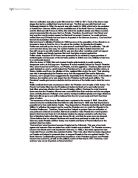As the people continued to suffer during several decades of repression there came a strong desire for reform. Although at first this was only among the educated, wealthy bourgeoisie, unemployment among small artisans encouraged them to join the revolution in hopes of secure jobs. When an uprising occurred in France, the German liberals decided that they too would start to push their own claims. The violent revolutions of 1848 scared princes such as Metternich into granting constitutions, parliamentary assemblies and appointed liberal ministers all over Germany. The German nationalists called a National Assembly in Frankfurt to prepare the unification of Germany. The people all wanted a unified Germany and this was their first attempt at it.
‘’Coal and iron’ not ‘blood and iron’ were the Prussian power base’ (Stiles the unification of Germany 1815 – 1890) Economic power, and especially the Zollverein, was of course one of the biggest factors contributing to German unification. After 1850 Germanys industries really began to take off. Factories were built at a spectacular rate, railroads grew connecting different parts of the country and Prussia had one of the best education rates to be seen in a long time. Along with industrialization came a steep up rise in population and huge numbers of people moving into the cities. The result of the railways, education and urbanization was that ideas began to spread and before 1871 Germany was already culturally and economically unified.
Although all of these factors were pointing Germany in the right direction for unification there was one man who ‘forged the Reich’ (Adolf Hitler): this man was Bismarck. One of the first things that he did was to increase Prussia’s popularity, and he did so in the war against Denmark. When Denmark attempted to make Schleswig and Holstein an integral part of Denmark, Austria and Prussia fought side by side in order to keep them as part of the German Confederation. They had a quick victory and Bismarck signed a settlement that let Prussia govern Schleswig, and Austria Holstein. The end result of this was that Prussia looked like the defender of Germany and Austria like a greedy land grabber. As time went on Austria and Prussia began to argue over occupation rights. Bismarck subsequently ordered troops to occupy Holstein in 1866, and as a result Austria demanded a German confederate expedition against Prussia. It took Prussia a mere seven weeks to defeat all of their enemies. A new union was formed: The North German Confederation. Where as the Frankfurt parliament had failed Bismarck cleverly managed to bring all the Northern States together successfully. All he had to do now was bring in the Southern States.
Even the anti-Prussian South Germans had now become too economically involved with Prussia to ally against her with a foreign power, and with this in mind Bismarck arranged that in the cause of war he would have full power of their railways and troops: all he needed now was the war. The perfect opportunity came along when Spanish government asked a member of the Prussian royal family to take up the Spanish crown. The French pressured Prussia not to accept this offer, but unfortunately they pushed it too far. They demanded that no Prussian Prince would ever take the Spanish crown. Bismarck then published these diplomatic communications in a provocative manner, angering the French into declaring war on Prussia. The south German states came to their aid and they had a glorious victory. Meanwhile Bismarck won the consent of the South German states to unite Germany with Prussia at its head. He had achieved his task and in January 1871 the Prussian King proclaimed the German empire.
The proclamation of the German empire was the result of a long process to which many factors contributed to. ‘German unification was, on the part of Bismarck, a series of favorable situations wisely grasped’ (Aronson, the Kaisers) Although the Zollverein, Prussia’s military power and industrialization all pointed Germany in the right direction of unification it would have taken many more years, or perhaps never, for Germany to unify. Bismarck took the pieces of jigsaw and put them all together to give us united Germany.
Mhairi Thomson 5s2 Word count: 891







